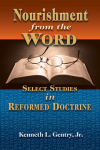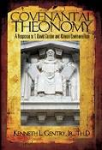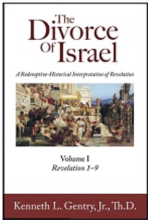GENESIS 2 EXPOSITION (2)
 PMW 2024-025 by Kenneth L. Gentry, Jr.
PMW 2024-025 by Kenneth L. Gentry, Jr.
This article concludes the two-part survey of Genesis begun in the last article.
Gen. 2:16
God commanded the man
This crucial command is given directly to Adam. Eve has not yet been created (2:22). This implies man’s functional loving and protective headship (not his superiority or dominance) over his wife within the family..
Gen. 2:17
you will surely die
Adam was not created in a declining and dying condition. But he was created capable of dying — if he disobeyed God. The covenant of works has consequences; man has responsibility. Death has two components, spiritual (Eph. 2:1; Col. 2:13) and physical. On the day Adam sinned, he died spiritually, but his body would eventually return to the dust physically (Gen. 3:19b; cp. Psa. 90:3; 104:29; Eccl. 12:7). This is certain because the Hebrew phrase behind “surely die” is a pleonasm, which is a dramatic verbal form expressing certainty. It may be literally translated “to die you will die.”
Gen. 2:18a
It is not good for the man to be alone
God created man in his image as male and female (1:27). Since God exists in a relationship as a Trinity (Father, Son, Holy Spirit), so must man as his image. That it is temporarily “not good” for Adam to be alone underscores the importance of companionship. A wife in Scripture is deemed “a good thing” from the Lord (Prov. 18:22; cp. Prov. 12:4; 19:14). At this juncture in creation week, however, this is the only aspect of creation declared “not good.” But this state of being “not good” was only temporary. At the end of creation week “God saw all that He had made, and behold, it was very good” (1:31). God created man first with the intention of creating woman for him (v. 22; cp. 1 Cor. 11:8; 1 Tim. 2:13), otherwise he could not procreate and fill the earth per God’s design and original command (1:28).
Nourishment from the Word
(by Ken Gentry)
Reformed studies covering baptism, creation, creeds, tongues, God’s law, apologetics, and Revelation
See more study materials at: www.KennethGentry.com
Gen. 2:18b
a helper suitable for him
Man is created first and separately from the woman, but he cannot accomplish his global task (1:26) alone, for it requires multiplying (1:28). The woman would be “suitable” for him, i.e., suited for him by corresponding exactly to him as his closest companion. Unlike his relation to the animals, she would be his physical, emotional, spiritual, and intellectual equal who also was in God’s image (1:27; 4:1–2; 5:3–4). Her being his “helper” does not imply her inferiority, for God is Israel’s “helper” (Deut. 33:7, 26, 29; Psa. 33:20; 30:10; 54:4).
Gen. 2:19a
out of the ground the Lord God formed
Here God’s forming the animals from the ground, and bringing them before Adam, does not contradict the chronology of 1:24, 26, where the animals are created before man. The verb “formed” has a pluperfect connotation, meaning “God already having formed….”
Gen. 2:19b
brought them to the man
In dealing with Adam’s temporary incompleteness (in that God is not yet finished creating the original couple from which mankind will arise), God brings the animals before him. Immediately before and after this animal review, the text states the intention of creating “a helper suitable” to Adam (1:18, 20). God was not using trial-and-error in a search for a suitable helper. Rather he is engendering in Adam a desire for a helper who would correspond to him on the human level. This is necessary not only for personal companionship but so that Adam might “be fruitful and multiply, and fill the earth” (1:28).
Gen. 2:19c
every beast of the field
Adam’s offspring will eventually name all the creatures of the entire world as an act of mankind’s divine call to dominion. But he starts the process of subduing the whole earth (1:28) by beginning on a small scale in a garden (2:8, 15). God’s supernatural assistance is certainly at work in bringing the animals to unfallen Adam. But his surveying and naming these animals may not involve the entire world. Like his beginning world dominion in Eden, this report may keep its focus on his immediate area, Eden. This may be why the text mentions “beast of the field” rather than the “beasts of the earth,” as in Genesis 1 (vv. 24, 25, 30). This may also explain why it refers only to those in his realm, not to the sea creatures (1:21–22). The birds “of the sky” are mentioned because they actually live “on the earth” (1:22) and would be in Eden.
Gen. 2:19d
that was its name
This is the first (and only) time we see Adam interacting with the animals. Thus, his first step in exercising dominion over them (as per Gen. 1:28; cp. Psa. 8:4–8) is to name them. In Scripture, to name something often implies authority or superiority over it. We certainly see this in God’s sovereign naming of portions of creation (1:5, 8, 10) and in various places elsewhere in Genesis (e.g., Gen. 2:19; 5:2; 17:5; 32:28). We also see this naming significance when God names the stars (Psa. 147:4; Isa. 43:1) and establishes Israel in the Promised Land (Deut. 12:5, 11). We see this also when someone conquers a city (2 Sam. 12:28), governs an area (Psa. 49:11), or leads a remnant of survivors (Isa. 4:1). This naming (or “calling”) would then be Adam’s creaturely reflection of God’s image.
Covenantal Theonomy
(by Ken Gentry)
A defense of theonomic ethics against a leading Reformed critic. Engages many of the leading objections to theonomy.
See more study materials at: www.KennethGentry.com
Gen. 2:20
the man gave names
In the Bible, names often define character, essence, or function (e.g., Gen. 2:23; 3:20; 17:5, 15; 25:26; 27:36; Matt. 1:23; Mark 3:16). Thus, Adam’s naming the animals was not solely to identify them (though it would include this as an exercises of his intellect). Rather it especially involves his exercise of authority over them by assigning them a function in his realm. And even more, contextually it shows that the animals could not function to be Adam’s “helper suitable for him” (v. 18): the animals could not assist him in reproducing (cp. 3:20; cp. 1:27–28).
Gen. 2:21
took one of his ribs
This literally signifies man’s rib, not simply his side (though the word can mean such): note that he has a plurality of them (“ribs”) from which only one is taken, then the gap is closed up.
Gen. 2:22a
taken from the man
Though everything in this section mentioned before the creation of woman was “from the earth” (2:7, 9, 19), the woman is “from the man” (cp. v. 23; 1 Cor. 11:8). She is the first creature in history to come from another living being.
Gen. 2:22b
brought her to the man
God not only ordained marriage as a creation ordinance but officiated at the first marriage by bringing the woman to the man. This entire episode underscores the divinely-ordained design for marriage: male and female (not homosexual). Jesus confirms both principles: “a man shall leave his father and mother and be joined to his wife, and the two shall become one flesh” (Matt. 19:5). God defines marriage, not man or the state, for Jesus speaks of marriage as being what “God has joined together” (Matt. 19:6b).
Gen. 2:23a
bone of my bones
Woman was literally “fashioned” (i.e., “built”) from man’s bone; she was not created fully formed in an instant by the command of God (as were the animals, 1:20, 24). Similarly Adam was “formed” from the dust. Both are carefully, lovingly created by God. The divine procedure in creating woman emphasizes the unity of husband and wife: at the beginning there was a literal physical unity (vv. 22–23) that is now emulated spiritually in marriage (Matt. 19:4–6; Eph. 5:28–29). True unity issues in harmony (Amos 3:3) and is especially expected in a believing context (Psa. 133:1; Matt. 18:19; Eph. 4:3; Phil. 2:2).
Gen. 2:23b
She shall be called Woman
Adam’s calling Eve “woman” emphasizes the God-designed and God-expected unity of man and woman: the Hebrew word ishshah indicates she came “from man [ish].” The fact that man “called” her “Woman” shows he authoritatively declared for all time that God created her from him. This should be recognized and understood in order to understand the true meaning of husband and wife relations. His recognizing her derivation from him entails neither the woman’s inferiority (the two are one, v. 24) nor the husband’s abusive power over her (Eph. 5:28–29).
Gen. 2:24a
leave his father and his mother
The word for “leave” (Heb., azab) is a vigorous word that can be translated “abandon, desert” (Eze. 23:29; 1 Kgs. 8:57). Here it strongly emphasizes that a new family unit is created in marriage, with a new authority structure. This does not entail any unloving abandonment of one’s parents, for elsewhere God’s law (Exo. 20:12) and Jesus encourage honoring them (Matt. 15:4–6).
Greatness of the Great Commission (by Ken Gentry)
An insightful analysis of the full implications of the great commission. Impacts postmillennialism as well as the whole Christian worldview.
See more study materials at: www.KennethGentry.com
Gen. 2:24b
be joined to his wife
The word “joined” (Heb. dabaq) speaks of clinging closely, so closely that the married couple may be said to “become one flesh.” Marriage is established by a solemn covenant (Prov. 2:17; Mal. 2:14) thereby serving as an image of God’s own loving commitment to his people (Jer. 31:31–32). We see the word translated “joined” (Heb., dabaq) used of covenant faithfulness in Deuternomy 10:20; 11:22; 13:4.
Gen. 2:25
not ashamed
Man and woman were originally naked but since sin was not yet in the world, thus they “were not ashamed.” Their shame arose before God, since they hide from him not from each other (3:8–11). This segues into the next narrative scene: (1) the word “naked” (Heb., arom) and “crafty” (arum, 3:1) are related; and (2) when they sin they recognize their nakedness as shameful. This narrative scene and the next explain the reason for and origin of clothing (3:21).
The Divorce of Israel: A Redemptive-Historical Interpretation of Revelation
This long-awaited commentary is now at the printer and should be available for the public in late April, 2024. It is an 1800 page, two-volume deeply exegetical, academic commentary on the Bible’s most mysterious book.
Pre-order today for a special discount. Click: HERE
Kenneth L. Gentry Jr.'s Blog
- Kenneth L. Gentry Jr.'s profile
- 85 followers



